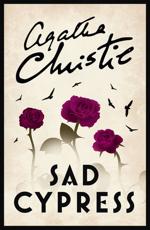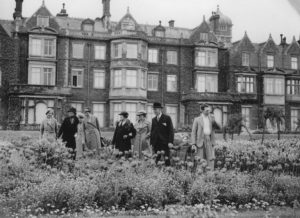
Poirot Score: 62
Sad Cypress
☆☆☆
Explanation of the Poirot Score
Please do not be put off by the meanly low Poirot Score! Sad Cyprus is a very enjoyable read. When I first read this book I thought it was brilliant. It gets a slightly lower marker than its fans might expect, due to our rigorous marking scheme, mainly because the plot is highly implausible in many different ways. This could be interpreted by the broad minded as over-zealous academic carping. Read Sad Cyprus and then, if you wish, look at the review for a full discussion of the plot holes….
Click here for Review: plot spoilers ahead
Trivia
Dedication:
“To Peter and Peggy McLeod.”
Doctors Peter and Peggy MacLeod ran the hospital in Mosul, Syria in the 1930s. During the London Blitz, the Macleod’s’ children went to stay with the Mallowans (Agatha Christie and her husband), in Devon.
What’s in a name? Rosa ‘Zéphirine Drouhin’: The thornless rose
 Zéphirine Drouhin {spelt differently from in the book} is thornless, with highly fragrant, double pink flowers. Zéphirine Drouhin was created in 1868 by the French rose grower Bizot, named after the wife of an amateur enthusiast.
Zéphirine Drouhin {spelt differently from in the book} is thornless, with highly fragrant, double pink flowers. Zéphirine Drouhin was created in 1868 by the French rose grower Bizot, named after the wife of an amateur enthusiast.
The rose is often used to climb up an archway over a path because people will not get scratched as they pass by. In Sad Cypress the rose climbs on a trellis by the Lodge.
One wonders if Christie bought a Zéphirine Drouhin for her new garden at Greenways, purchased in 1938, and seeing the thornless rose gave her the idea for this story.
Christie must be spinning in her grave about this book cover for her novel, which shows roses with thorns….Christie was very particular about accurate book covers: see Death on the Nile trivia.
On being a Bastard: The English Laws of Inheritance
Historical Background:
In medieval Wales, unlike England, a “bastard” was a child not acknowledged by its father. All children, whether born in or out of wedlock, that were acknowledged by the father enjoyed the same legal rights, including the right to share in the father’s estate. There is another fictional detective, the mediaeval monk Brother Cadfael of Shrewsbury Abbey, who solves a crime based on this piece of Welsh law. Edward I of England conquered Wales during the 1270s-1280s, but Wales was only fully incorporated into the Kingdom by the Laws in Wales Acts 1535–1542.
England’s Statute of Merton (1235) stated, regarding illegitimacy: “He is a bastard that is born before the marriage of his parents.” This definition also applied to situations when a child’s parents could not marry, as when one or both were already married or when the relationship was incestuous.
In English civil law bastards could only inherit their mother’s estate if the mother acknowledged the child as hers. In 1939 there were no genetic tests. A bastard was unable to be an heir to the father’s property, and could not be legitimized by the subsequent marriage of father to his mother.
The Legitimacy Act 1926 of England and Wales legitimized the birth of a child if the parents subsequently married each other, provided that they had not been married to someone else in the meantime. However this does not apply in Sad Cyprus.
It is hard for young readers to understand the stain bastardy still had in the first two-thirds of the 20th century. I was brought up in the 1950s, and my mother employed a ‘daily’ helper called Mrs. Peck, whom I loved chatting to. I found her sobbing one day and asked what was wrong. Mrs. Peck’s daughter was going to have a baby. I remember I said I thought that was supposed to be a good thing, and poor Mrs. Peck ran out of the room. My mother later explained that Mrs. Peck’s daughter was unmarried and would live at home with her parents and the baby. Mrs. Peck had resigned her job with us, as she ‘didn’t want to bring shame on our household’. I remember thinking how silly adults were, as Mrs. Peck would need more money to look after the baby too. My mother insisted she stay. Four years later Mrs. Peck’s daughter married the very sweet local vicar, and spent her life running charities for unmarried mums. We were in the swinging ‘60s by then, when attitudes began to change.
In the 21st century with genetic testing, and changes in the UK law, legitimate and illegitimate offspring are treated equally, if a person dies intestate. It is worth noting that in the UK 50% of people still die without making a will. According to the Office of National Statistics, in 2016, 52% of births occurred within marriage or civil partnership, which means that 48% were from co-habiting partners, including only about 5% of women who chose to be sole parent on the birth certificate. With the rise of illegitimate births, multiple marriages or partnerships, the situation is ever more complex.
‘Handsome clothing’: velvet tea-gowns, musquash and sables: social distinctions of the 1930s
Elinor clears out her aunt Mrs. Welman’s clothes, after her death. Mrs Welman was in her 60s in 1939, when she died, so must have been born in the 1870/80s. Agatha Christie was born in 1890. Christie had a very difficult time clearing out her mother’s things, after Clara’s death in 1926.
In the 21st century fur has gone out of fashion, for ethical reasons.
Readers will no longer appreciate the social distinction made in the book between a musquash fur coat [which Elinor gives to the housekeeper, Mrs Bishop] and the sables, which Elinor puts aside for herself, after they are ‘remodelled’. The price of a sable coat would have been several magnitudes more than a musquash coat.
Fur pelts could be unpicked and resewn into the latest fashion. The sable is a type of marten, which lived in Russian forests until it was hunted to virtual extinction. Sable coats were a very valuable luxury item.
 Sables are now farmed, like mink.
Sables are now farmed, like mink.
 The muskrat [see picture] a huge vole from North America, killed for its fur and meat. They are four times heavier than an adult brown rat. Just like mink, they escaped from European fur farms and are now considered a pest.
The muskrat [see picture] a huge vole from North America, killed for its fur and meat. They are four times heavier than an adult brown rat. Just like mink, they escaped from European fur farms and are now considered a pest.
 Tea gown made in 1910 the sort of dress Mrs Welman would have worn when she fell in love with Sir Lewis Rycroft
Tea gown made in 1910 the sort of dress Mrs Welman would have worn when she fell in love with Sir Lewis Rycroft
It is interesting to note that the house, Hunterbury, occupied by one widow [Mrs Welman] in 1939 had a housekeeper, a gardener and under gardener, a Lodge keeper, a cook, two other servants [Milly and Olive]. Furthermore Elinor, when she is talking to Roddy about bequests then says ‘£5 each to the others’: not specifying how many ‘others’ there was. So at least 7 servants and probably nearer 10. Christie knew about servants, having been brought up at Ashfield, a large house in Torquay, in the 1890s.
Autobiographical Elements?
In Sad Cypress Elinor’s father had been a wealthy man, but ‘speculated and lost’ his money. Agatha Christie’s father’s three trustees swindled him out of his wealth. Elinor says ‘Poor father never had much business sense. He got very worried about things before he died.’ Christie’s parents were forced to rent out Ashfield, their large house, and live on the rental income in cheap hotels in France when Agatha Christie was a child. It was why Christie spoke fluent French. Mrs Welman’s husband, Henry, died of double pneumonia after only 5 years of marriage. Christie’s father died of double pneumonia when she was only 11 years old. The final similarity is the uncomfortable parallels between Elinor wishing Mary Gerrard dead for taking Roddy away from her, and ‘bewitching him’. One might speculate on Agatha Christie’s feeling towards Nancy Neele after Archie Christie fell heavily in love with this bewitching young woman.
The Current News in 1939
 This was the last book written before the outbreak of World War II in September 1939. What is odd is that there are two mentions of real current personages, but no hint of the threat of war. Mary Gerrard has just come back from 2 years at a finishing school in Germany, with no mention of the political situation there. This is quite unlike ‘N or M’ , Christie’s war effort novel written in 1940.Yet Inspector Marsden mentions that he knows Poirot has the ‘current home secretary in his pocket’. Sir Samuel Hoare [pictured] was a senior British Conservative politician, who was Home Secretary from 1937-39. He had been educated at New College, Oxford, where Max Mallowan, Agatha’s second husband, had also studied. Such a mischievous comment by Scotland Yard makes one wonder what Poirot was doing: trying to prevent the war?
This was the last book written before the outbreak of World War II in September 1939. What is odd is that there are two mentions of real current personages, but no hint of the threat of war. Mary Gerrard has just come back from 2 years at a finishing school in Germany, with no mention of the political situation there. This is quite unlike ‘N or M’ , Christie’s war effort novel written in 1940.Yet Inspector Marsden mentions that he knows Poirot has the ‘current home secretary in his pocket’. Sir Samuel Hoare [pictured] was a senior British Conservative politician, who was Home Secretary from 1937-39. He had been educated at New College, Oxford, where Max Mallowan, Agatha’s second husband, had also studied. Such a mischievous comment by Scotland Yard makes one wonder what Poirot was doing: trying to prevent the war?
Poirot manages to thaw Mrs Bishop’s suspicion of foreigners by talking about ‘a really interesting theme- no less than the selection of a suitable future husband for Princess Elizabeth’. Poirot tells Mrs Bishop about a ‘recent visit’ to Sandringham. Sandringham is the Royal Estate in Norfolk.
Its rather a surprise to find out that Princess Elizabeth was only 13 years old in 1939, and Prince Philip was 18 yrs old: this was the year they first met. Princess Elizabeth married Prince Philip in Westminster Abbey on 20 November 1947. Poirot, who has now been in England about 20 years, is absolutely in the top social circles of British Society by 1939, visiting the Royal Family at Sandringham, and helping the Home Secretary. Not bad for a war refugee, who came over with nothing but his grey cells.
Sad Cypress
Sad Cypress is a quote from a song in Shakespeare’s Twelfth Night.
“Come away, come away, Death,
And in sad cypress let me be laid;
Fly away, fly away, breath,
I am slain by a fair cruel maid.
My shroud of white stuck all with yew,
O prepare it! My part of death no one so true did share it.
Not a flower, not a flower sweet,
On my black coffin let there be strewn:
Not a friend, not a friend greet
My poor corpse, where my bones shall be thrown.
A thousand thousand sighs to save, lay me
O where Sad true lover never find my grave, to weep there!”
On the face of it, it is a strange Shakespeare quote to choose, since the fair maid [Mary Gerrard] is slain, not Roddy, who falls in love with her. Unless one interprets it that by being fair, Mary has taken Roddy away from Elinor, and so Elinor is ‘slain’: her passionate, desperate love for Roddy killed by Roddy’s rejection. Or, a third interpretation, is that Elinor is the ‘fair, cruel maid’: as at the start of the book it is clear that Elinor is being prosecuted for murdering Mary Gerrard and her own aunt. Elinor could be seen as the ‘sad true lover’ of Roddy. ‘Sad Cypress’ is a good piece of alliteration, but the American publishes were worried their readers would confuse cypress with Cyprus. In Tudor times coffins were made of any available wood, and apparently cypress was quite common.
Euthanasia
Euthanasia is the act of deliberately ending a person’s life to relieve suffering. In this case, Mrs Welman after her stroke asks Dr Lord, her family doctor ‘What’s the good of living stretched out like this, and cared for like a baby?’. After her death, Dr Lord confides to Poirot that Mrs Welman ‘Asked me more than once if I couldn’t ‘finish her off’. She hated illness…the indignity of lying there’.
Elinor says about Mrs Welman ‘I do mind so terribly for her…One does feel, Roddy, that people ought to be set free – if they really want it’.
Roddy said; ‘I agree. It’s the only civilized thing to do. You put animals out of their pain. I suppose you don’t do it with human beings simply because, human nature being what it is, people would get shoved off for their money by their fond relations.’ A succinct summary of the arguments that have raged in the House of Lords recently. Any doctor who gives a patient with terminal cancer, or a severe stroke, an overdose of muscle relaxants or opiates to end their life would be considered to have carried out murder.
Assisted suicide is the act of deliberately assisting or encouraging another person to kill themselves.
Euthanasia and assisted suicide are illegal under English law. Euthanasia is regarded as either manslaughter or murder and is punishable by law, with a maximum penalty of up to life imprisonment today but a capital offence in 1939. Assisted suicide is illegal under the terms of the Suicide Act (1961) and is punishable by up to 14 years’ imprisonment.

